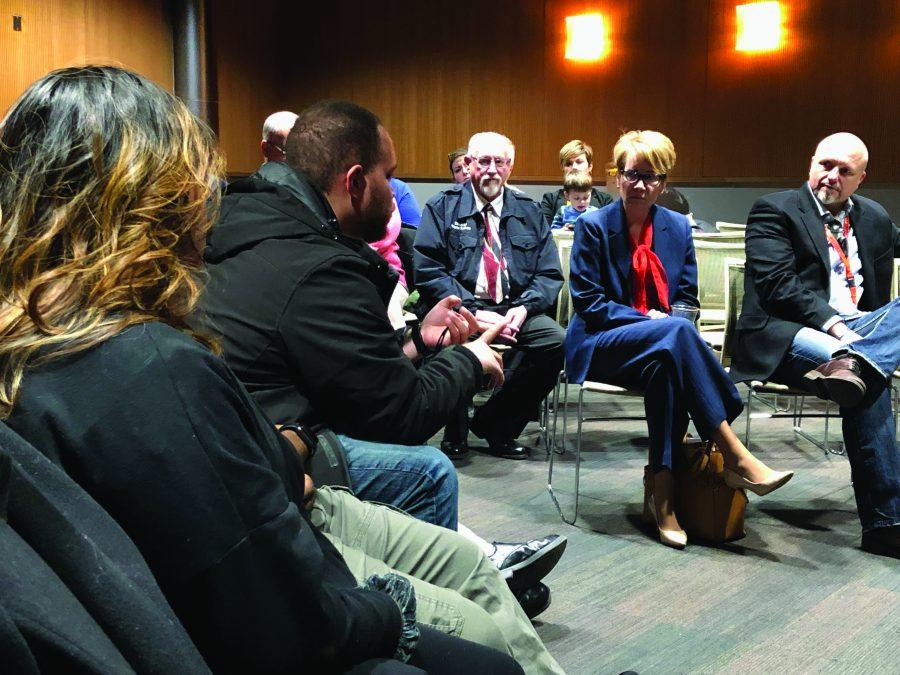Students, faculty, Campus Safety officers and college administrators converged in the Carbone Family Auditorium on Monday, April 1 for an open discussion led by former Syracuse Police Chief Frank Fowler.
While Fowler offered his perspective on building relationships between his department and the city of Syracuse, he ultimately served as a facilitator between those who attended the event. The topics discussed ranged from students’ concerns over racial profiling and inconsistent enforcement of rules by Campus Safety officers to the need for more dialogue between the Office of Campus Safety and the student body.
Senior Kendal Santiago was an active participant throughout Monday’s discussion. Santiago said she feels that racial profiling and bias influence Campus Safety officers’ policing practices at UC and that herself and other students feel college administrators are not willing to hear their concerns.
Senior and Student Government Association President Lukus Becker, who was one of roughly 15 students who attended the open discussion, said he was underwhelmed by student turnout at the event.
However, this did not stop him from voicing concerns he had over the relationship between Campus Safety officers and students.
“The conversation is never over, and it needs constant work,” Becker said.
Junior Dan Wilcox said he feels that cooperation and conversation are “the only ways” that tensions between Campus Safety and students will be resolved. However, he said that this will involve broader participation from fellow students.
“It comes back to power in numbers,” Wilcox said. “The more people you have to voice their opinions, the more powerful they are going to be. Even if you don’t have an opinion, you’re a member of the community and you should be involved with what’s going on in the community.”
Clemmie Harris, a professor of American History and Africana Studies at UC, spoke passionately about his concerns over the racial climate at Utica College — bringing Santiago and others in the audience to tears. In an interview on April 2, Harris explained that the solution to resolving tension between students, Campus Safety and college administrators involves addressing the larger issues of race and race relations at UC, not just by having one conversation.
“When you have a paradigm rooted in de facto segregation, the vulnerability of those groups that have been historically marginalized increases,” Harris said. “The claims of racism against the institution by those individuals increases because the broader work of bridging issues of segregation have not taken place.”
The issues of de facto segregation Harris referred to includes a lack of minority representation in UC’s faculty and administration as well as a feeling from students that they are not being adequately heard. But before concrete changes can be made, he explained, there must be an opportunity for students to “air their grievances” through extensive dialogue that goes beyond a single session.
“UC has attempted to have a series of conversations, but these series of conversations come within the context of these community meetings,” Harris said. “Community meetings have a degree of value, but they are not going to bring about the types of healing because, ultimately, the assumption is that once that community meeting is over, the problem has been resolved.
“You can’t be afraid to go through the storm. You have to be willing to have these types of hard conversations where these grievances, no matter where they are coming from, need to be addressed.”
Only when these grievances have been aired can progress be made towards mending relationships and building a sense of community among all members of the Utica College community, Harris explained.
“What I see right now is a breakdown in trust, and the only way to get people talking again is there has to be an ability for those who feel grieved to be heard, and it’s not going to be in one sitting,” Harris said. “This is how the UC family must heal itself.”


















![President Todd Pfannestiel poses with Jeremy Thurston chairperson Board of Trustees [left] and former chairperson Robert Brvenik [right] after accepting the university's institutional charter.](https://uticatangerine.com/wp-content/uploads/2023/10/unnamed.jpeg)


















































































































